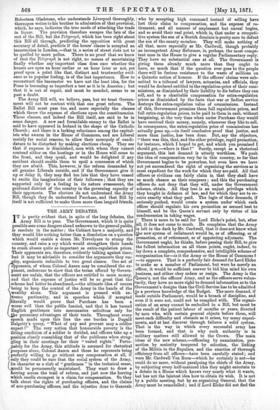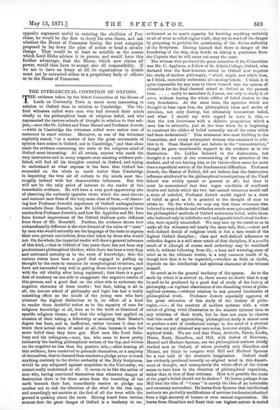THE ARMY DEBATES.
IT is pretty evident that, in spite of the long debates, the Army Bill is to pass. The Government, which it is quite possible sees some dangers ahead unknown to the general public, is resolute in the matter ; the Cabinet have a majority, and they would like nothing better than a dissolution on a question which would enable a dozen Mr. Trevelyans to stump the -country, and raise a cry which would strengthen their hands to crush abuses quite as important as extra-regulation prices. Their opponents are, therefore, evidently talking against time; but it may be advisable to consider the arguments they em-
loy, arguments reducible to two great classes. One set of { opponents, of whom Colonel Anson may be considered the ex- ponent, endeavour to show that the terms offered by Govern- ment are unfair, that the officers are entitled to more money, and that the expense of justice will be so great that the scheme had better be abandoned,—the ultimate idea of course being to keep the control of the Army in the hands of the wealthy alone. This argument is pressed with ex- treme pertinacity, and in speeches which if accepted literally would prove that Purchase has been a worse evil than the public fancied, and that it has turned English gentlemen into mercenaries solicitous only for e pecuniary advantages of their trade. Throughout every speech made upon this line the one burden is Dugald Dalgetty's query, "What of pay and provant may a soldier expect ?" The very notion that honourable poverty is the fitting condition of a soldier is derided, and officers take up a position closely resembling that of the publicans when strug- gling in their meetings for their "vested rights." Fortu- nately for the Army, this attitude is assumed for rhetorical
{
purposes alone, Colonel Anson and those he represents being perfectly willing to go without any compensation at all, if only they could be sure that the social system of the Army, its character as a club of " gentlemen " in the technical sense, ould be permanently maintained. They want to draw a herring across the trail of reform, and just now the herring which smells strongest is a claim for compensation. So they talk about the rights of purchasing officers, and the claims of non-purchasing officers, and the injustice done to Generals who by accepting high command instead of selling have lost their claim to compensation, and the expense of re- tirement, and all manner of unpleasant but unreal bogies, and so avoid their real point, which is, that under a competi- tive system the son of a Scotch dominie is pretty sure to defeat the son of the county member. They will make nothing of all that, more especially as Mr. Cardwell, though probably an incompetent Army Reformer, is, perhaps, the most compe- tent man in the House to give a regular Parliamentary reply. They have no substantial case at all. The Government is giving them already much more than they ought to have, so much that if the question ever goes to the people there will be furious resistance to the waste of millions on a Quixotic notion of honour. If the officers' claims were sub- mitted to a tribunal of lawyers, actuaries, and officials, they would be declared entitled to the regulation-price of their com- missions, as diminished by their liability to die before they can sell, and to a charitable compensation for extra-regulation prices as diminished by the facts that war or Indian service destroys the extra-regulation value of commissions. Instead of this, Government promises them full regulation prices, and full extra-regulation prices, to be paid to them in cash, without bargaining, at the very time when under Purchase they would have received their money, namely, whenever they like to sell. In consequence, the extra-regulation price of commissions has actually gone up,—in itself conclusive proof that justice, and more than justice, has been done. But, say the objectors, "there was this, that, and the other privilege, rapid promotion, for instance, which I hoped to get, and which you promised I should get,—where is that ?" Surely, except as a rhetorical argument, this last demand is utterly worthless. We push the idea of compensation very far in this country, so far that Government begins to be powerless, but even here we have not yet surrendered the right of organizing the services as is most expedient for the work for which they are paid. All that officers or civilians can fairly claim is, that they shall have as much chance as their compeers ; and this the purchasing officers do not deny that they will, under the Government scheme, obtain. All they lose is an unjust privilege which they bought in defiance of law, and for which they are to re- ceive exactly what they paid. The logic of their demands, if seriously pushed, would create a system under which each officer should regulate his own promotion as seemed best to himself, and be the Queen's servant only by virtue of his condescension in taking wages.
There is more to be said for Lord Elcho's point, but, after all, it does not come to much. He complains that the Army is left in the dark by Mr. Card well, that it does not know what the new system of enlistment would be, or of officering, or of promotion, or of retirement, or of appointing adjutants. The Government ought, he thinks, before passing their Bill, to give the fullest information on all those points, ought, indeed, to lay down a complete, comprehensive, and intelligible scheme of reorganization for—is it the Army or the House of Commons ?
—to approve. That is a perfectly fair demand for Lord Elcho to make as a member of Parliament, but were he merely an officer, it would be sufficient answer to bid him mind his own business, and either obey orders or resign. The Army is the ueen's, not the officers' Army, and as the officers serve volun- tarily, they have no more right to demand information as to the Government's designs than the Civil Service has to be admitted to a previous knowledge of the Budget. The mere demand, if made outside Parliament, would be a breach of discipline, and even if it were not, could not be complied with. The organi-
zation of an army cannot be embodied in a Bill, but must be the result of the patient labour of months or years, directed
by men who, with certain general objects before them, will meet each difficulty and obstacle as it arises, try many experi- ments, and at last discover through failures a solid system.
That is the way in which every successful army has been formed, and that is why such authority is in military matters still allowed to the Crown. The main ideas of the new scheme,—officering by examination, pro- motion by seniority tempered by selection, the linking of the Militia to the Regulars, and the exaction of thorough efficiency from all officers—have been carefully stated ; and were Mr. Cardwell Von Boon—which he certainly is not—he could do no more, without paralyzing the chiefs of the Army, by subjecting every half-matured idea they might entertain to a debate in a House which knows very nearly what it wants, but has not the faintest idea how to obtain its wish. It is not by a public meeting, but by an organizing General, that the Army must be remodelled ; and if Lord Elcho did not find the opposite argument useful in resisting the abolition of Pur- chase, he would be the first to decry his own thesis, and ask whether the House of Commons during the next campaign proposed to lay down the plan of action or head a cavalry charge. That would be at least as sensible as the course which Lord Elcho advises it to pursue, and would have this farther advantage, that the House, which now claims all power, would then have to accept also all responsibility. If we are to have an Army at all, its organization in details must not be entreated either to a proprietary body of officers or to the House of Commons.



































 Previous page
Previous page